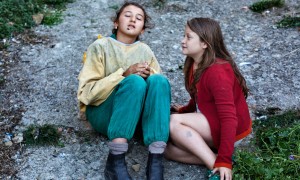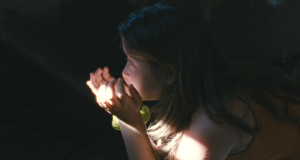 Review: One Night Only
Review: One Night Only
The Wonders | Alice Rohrwacher | Italy | 2014 | 111 minutes
Spotlight Cinema, Madison Museum of Contemporary Art (227 State Street), Wednesday, November 11, 7:00pm»
James Kreul reviews the Cannes Grand Prix winner, The Wonders, which is at its best when it favors unobtrusive observation over intrusive techniques.
Alice Rohrwacher’s The Wonders / Le Meravigle, winner of the Grand Prix at the 2014 Cannes Film Festival, is most interesting when it minds its own beeswax. The film captures coming-of-age growing pains of a teenage girl and the struggles of a Tuscan family’s artisanal honey business in an compelling, unobtrusive, observational style. When it moves away from those themes and dabbles in magic realism in the third act, it is far less engaging and effective.
The Wonders follows a family living on a run-down rented farm, led by an idealistic beekeeper, Wolfgang (Sam Louwyck), who seems intent on isolating the family from the modern world as much as possible. Among the family’s many obstacles to happiness, the most intriguing conflict is between Wolfgang and his teenage daughter, Gelsomina (Maria Alexandra Lungu), who wants something better, or at least different, for herself and her family.
That better and different thing seems to drop into the Gelsomina’s lap when she and her family come across a television crew shooting an advertisement for a competition, “The Land of Wonders” (roughly translated), that celebrates ancient Etruscan culture and local heritage. Gelsomina is transfixed by the beautiful host (Monica Bellucci), but she also realizes that the prize money involved could pay off many family debts. Wolfgang, however, wants nothing to do with the competition, setting in motion of one of many conflicts between them.
Wolfgang does bring one outside element to the family: he agrees to supervise the rehabilitation of a German juvenile delinquent, Martin (Luis Huilca), who can provide extra labor on the farm. But Wolfgang’s main motivation is the stipend that supervising Martin will provide. His wife Angelica (Alba Rohrwacher) objects on the grounds that Martin could be a threat to their young daughters. But it is clear that Angelica does not have much power within the household, in fact she might rank behind Gelsomina in influence.

Once these plot elements are set in motion, The Wonders actually works best when it forgets about them. Many of the most vivid moments are purely observational, rather than dramatic. For example, there’s a wonderful image of Gelsomina teaching her younger sister Marinella (Agnese Graziani) how to “drink” from a beam of light streaming through a darkened barn. And, of course, there are several memorable moments with bees. Most of them are quiet and pragmatic, but there are also moments of subtle spectacle. Gelsomina shows Martin a trick where a bee slowly crawls out of her mouth and walks around on her cheek. It is interesting that this image has far more power when allowed to just happen rather than to serve the plot explicitly, which it does when it is repeated in the third act.
The transition into the third act is a bit clunky, as all of the plot elements (the stipend for Martin’s supervision; the application to the television contest; the need to change the buckets in the honey lab; and even a promised present for Gelsomina) all come together on one fateful day, in a way that seems very forced given the idyllic pacing of the rest of the film. But Rohrwacher unfortunately chooses to undercut the key dramatic conflict between Wolfgang and Gelsomina by moving on instead of resolving it on screen. At some point, based on the third act, Wolfgang concedes to Gelsomina, an crucial moment in the development of both characters. But in art cinema, ellipsis often wins the day, as it does here. The dramatic conflict is deflected onto Wolfgang’s gift that was supposed to be for Gelsomina.
The third act presents a few problems. First, it takes us away from everything visually interesting in the first two-thirds of the film. Second, what happens is not very interesting or dramatic, even if we are rooting for Gelsomina and her family. And finally, the third act also introduces a few moments of magical realism, which are decidedly hit and miss. One moment, involving Gelsomina and Martin, is at least intriguing because we’re not exactly sure what we’re looking at. But the last moments of the film are more like a clichéd art-cinema throwback than an organic conclusion to the film.
Still, The Wonders won the Grand Prix. I’d like to think it won for the first two-thirds of the film, but perhaps the last third plays better abroad. In its dabbling with art cinema excess, it reminds me of Jauja, of which I was critical on similar grounds despite its general critical acclaim. The Wonders is certainly worth seeing as a showcase for Rohrwacher’s visual talents, and for some strong performances (especially young Lungu). It is unfortunate that Grand Prix winners at Cannes can’t seem to catch a theatrical engagement in Madison these days. I’d prefer to find more than attendees from just one screening who might disagree with me.